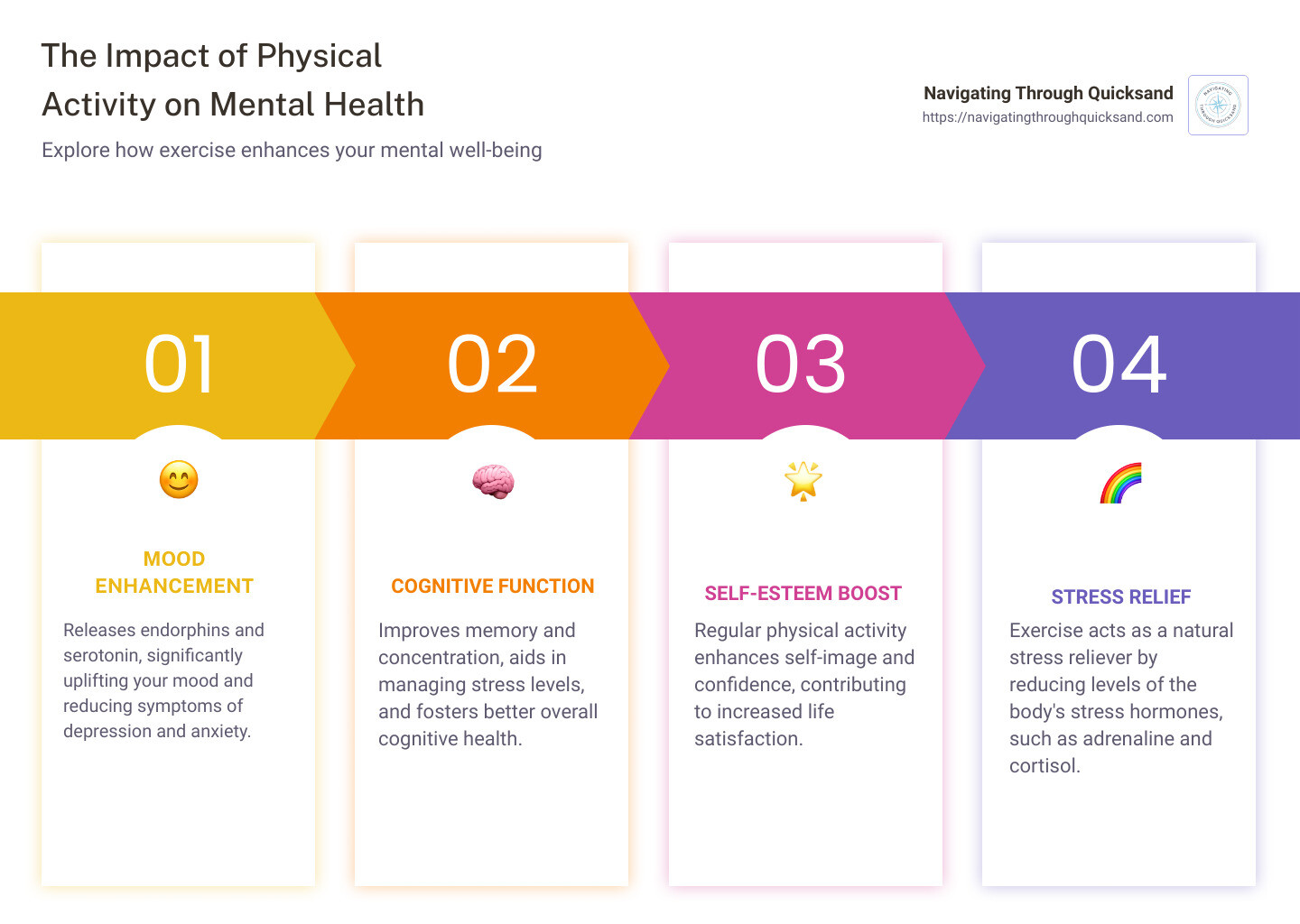The effects of physical activity on mental health are profound and essential for both emotional stability and cognitive function. If you’re seeking a quick understanding of how regular exercise can benefit your mind, here are some points to consider:
- Physical activity releases endorphins and serotonin, which enhance your mood and can help alleviate symptoms of depression and anxiety.
- Regular exercise can improve concentration, memory, and help manage stress levels.
- Engaging in physical activities can boost self-esteem and overall mental well-being.
Physical activity is not just about maintaining your physical health but is also crucial for mental health. Whether you’re stuck in a demanding job or navigating personal challenges, incorporating a routine that includes exercise can significantly influence your mental resilience and emotional health. As you move your body, your mind reaps benefits that extend far beyond the physical, helping to clear mental fog and reduce feelings of anxiety and depression.

In a world filled with complexities and challenges, understanding the connection between physical activity and mental health is vital. Being physically active is not just beneficial; it’s essential for mental well-being, helping to improve mood and aid in the management and treatment of various mental health conditions.
Table of Contents
Let’s dive into how engaging your body can empower your mind, enhancing your ability to navigate through life’s ‘quicksands.’
Understanding the Effects of Physical Activity on Mental Health
Physical activity is more than just a way to improve physical fitness; it has profound impacts on mental health, influencing everything from brain function to mood enhancement. Here’s how moving your body can positively affect your mind:
Brain Function
Regular physical activity boosts brain health in several ways. It enhances cognitive functions such as memory, focus, and problem-solving skills. Exercise stimulates the release of proteins in the brain that support the health and growth of neurons, the cells responsible for transmitting information throughout the brain and body.
Endorphins and Serotonin
When you exercise, your body releases chemicals called endorphins. These are often referred to as ‘feel-good’ hormones because they create a sense of happiness and euphoria. Additionally, physical activity can increase the production of serotonin, another key neurotransmitter associated with mood.
The release of these chemicals is why you often feel more optimistic and less anxious after a workout. To maintain these positive effects on mood and mental health, it’s important to exercise regularly, as it leads to an enormous sense of well-being by positively impacting depression, anxiety, stress, and overall mood through various physiological and psychological processes.
Cognitive Function
Engaging in regular physical activity is linked to sharper memory and better thinking skills. Research suggests that exercise promotes the growth of new brain cells and helps prevent age-related decline. This is crucial not just for the elderly but for people of all ages aiming to maintain and enhance their mental acuity.
Mood Enhancement
The direct link between physical activity and improved mood is one of the most compelling reasons to get moving. Exercise can act as a natural and effective anti-depressant. It helps block negative thoughts and provides a distraction from daily worries, allowing you to break the cycle of negative thoughts that often feed depression and anxiety.
Regular physical activity is a powerful tool for enhancing mental health, improving everything from cognitive functions to overall mood. By understanding how exercise impacts the brain and its neurotransmitters, you can better harness its benefits to boost your mental well-being. This knowledge empowers you to take control of both your physical and mental health, navigating through life’s challenges with greater ease and resilience.
Key Mental Health Benefits of Regular Physical Exercise

Improved Mood and Emotional Well-being
One of the most immediate effects of physical activity on mental health is the improvement in mood and emotional well-being. Exercise triggers the release of endorphins, natural chemicals in your brain that are often referred to as “feel-good” hormones. These endorphins play a crucial role in reducing the perception of pain and can evoke a positive feeling in the body similar to that of morphine.
Positive feelings aren’t just a temporary benefit. Over time, regular exercise helps stabilize your mood and reduce mood swings. Physical activity can also mitigate the physiological effects of stress, helping to avoid the cycle of stress and anxiety. Studies have shown that regular aerobic exercises like jogging, swimming, and even brisk walking can significantly decrease overall levels of tension, elevate and stabilize mood, and improve sleep and self-esteem.
Enhanced Cognitive Functions
Regular physical exercise doesn’t just boost your spirits; it also sharpens your mind. Activities that get your blood pumping increase the flow of blood to the brain, which can help enhance your memory and improve focus. Exercise is also known to stimulate the production of growth factors—chemicals in the brain that affect the health of brain cells, the growth of new blood vessels in the brain, and even the abundance and survival of new brain cells.
Neuroplasticity, or the brain’s ability to adapt and grow, is significantly influenced by physical activity. This means that regular exercise can improve cognitive flexibility, helping your brain to better adapt to new information and situations.
By incorporating regular physical activity into your routine, you engage a natural and effective method to boost both your mental and physical health. The effects of physical activity on mental health are profound and supported by extensive research, making exercise a powerful ally in maintaining and enhancing mental well-being. Continue to the next section to learn more about how specific exercises can combat common mental health issues like ADHD and depression.
How Physical Activity Combats Common Mental Health Issues
Physical activity is more than just a way to improve physical health—it’s a critical tool for managing and improving mental health, particularly effective in managing major depression and various mental health conditions such as schizophrenia, anxiety, depression, and substance abuse. Here, we explore how exercise helps combat common mental health issues such as ADHD, PTSD, anxiety, and depression. Additionally, engaging in physical activity can prevent and improve mental health problems, enhancing well-being and the quality of life for those experiencing these challenges.
Managing Depression Through Exercise
Exercise is a potent remedy for depression. Studies, such as those by Harvard T.H. Chan School of Public Health, have shown that regular physical activity can reduce symptoms of depression by up to 26%. This benefit is largely due to the physiological changes in the brain triggered by exercise:
- Endorphins: These are chemicals released during exercise that are known to make you feel good and reduce perceptions of pain.
- Neural Growth: Physical activity promotes the growth of new nerve cells and improves the connectivity between brain cells.
- Inflammation Reduction: Exercise can decrease inflammation, which has been linked to major depressive disorders.
Exercise as a Tool for Anxiety Relief
For those dealing with anxiety, exercise can be a transformative tool. Engaging in physical activity releases endorphins, which act as natural painkillers and mood elevators. Beyond the biochemical impacts, exercise also offers several psychological benefits:
- Stress Tension Release: Physical activity helps in loosening the muscles that tighten up due to stress, providing a physical relief from the constant state of tension.
- Mental Energy Boost: Regular exercise can increase stamina and energy levels, helping to alleviate some of the fatigue often associated with anxiety disorders.
Physical activities like yoga and mindfulness-based exercises encourage a focus on the present moment, helping to interrupt the flow of worries and anxieties.
Addressing ADHD and PTSD Through Physical Activity
- ADHD: Activities that increase heart rate boost the brain’s dopamine, norepinephrine, and serotonin levels—neurotransmitters that affect focus and attention. Exercise, therefore, can improve concentration, motivation, memory, and mood, similar to the effects of ADHD medications.
- PTSD: Exercise can help individuals with PTSD by helping the nervous system become “unstuck” from the immobilization stress response. Practices that involve mindfulness and physical engagement, like tai chi or swimming, can significantly aid in this process.
In summary, regular physical activity is a versatile tool that not only enhances physical health but also plays a crucial role in mental health management. By reducing symptoms of depression and anxiety, boosting mental energy, and aiding in the management of ADHD and PTSD, exercise proves to be an essential element in the pursuit of mental wellness. Keep these benefits in mind as you consider integrating more physical activity into your daily routine.
Practical Tips for Incorporating Exercise into Your Daily Routine

Getting started with regular exercise can be challenging, but with the right approach, it can become an enjoyable and integral part of your daily life. Here are some practical tips to help you incorporate exercise into your routine effectively.
Joining an exercise class can be particularly beneficial for beginners or those seeking social motivation. These classes offer the dual benefits of structured physical activity and a supportive community, making it easier to overcome barriers related to body image anxiety or the exercise environment. For individuals concerned about these issues, opting for a female-only class or attending with a companion can provide a comfortable and motivating setting.
For those new to physical activity, starting with just 30 minutes of moderate exercise five times a week can serve as an effective entry point. This can include moderate intensity exercise like walking, hiking, or riding a bike, which not only raises the heart rate but also helps you breathe faster, reaping both physical and mental health benefits. Remember, these sessions can be broken down into smaller, more manageable segments to fit into your daily schedule, making it easier to maintain a consistent exercise routine.
Finding the Right Type of Exercise for You
The best type of exercise is the one you enjoy and can stick with. Here are some options to consider:
- Walking: It’s simple, free, and one of the easiest ways to get more active, lose weight, and become healthier. Sometimes overlooked as a form of exercise, walking briskly can help you build stamina, burn excess calories, and make your heart healthier.
- Yoga: Known for its stress-reducing qualities, yoga can be an excellent way to improve flexibility, strength, balance, and mental health.
- Pilates: This is great for improving posture, flexibility, and abdominal strength. It can also help with back pain, which can be a barrier to other forms of exercise.
- Aerobics: This can be a fun way to improve your fitness, especially if you like a group setting. Whether high or low impact, it’s effective for heart health and weight loss.
- Dancing: Dancing is not only fun but also a great way to burn calories. Whether it’s ballroom, salsa, or free-style, dancing can provide a great cardiovascular workout and improve your mood.
Overcoming Barriers to Exercise
- Motivation: Start with setting small, achievable goals. Celebrate when you reach these goals and let them motivate you to set and reach even higher ones.
- Time Management: Schedule your workouts as you would any important appointment. Break it down into shorter sessions throughout the day if finding a long block of time is hard.
- Physical Limitations: Consult with a healthcare provider about exercises that would be safe and effective for you, especially if you have physical limitations. Swimming, for example, can be a good choice for those with joint issues.
Incorporating these types of exercises into your routine can help ensure that you stay engaged and enjoy the benefits of physical activity. Consistency is key. It’s not about how much you do in one go; it’s about what you can sustain over the long term.
Navigating Through Quicksand: Empowering Your Journey

When it comes to tackling life’s challenges, understanding the effects of physical activity on mental health can be a game-changer. Regular physical activity not only boosts your physical health but also empowers you mentally, providing the strength to navigate through life’s adversities.
Empowerment Through Physical Activity
Engaging in regular physical activity can empower you by enhancing your self-esteem and overall mental resilience. Studies have shown that exercise releases endorphins, often known as ‘feel-good’ hormones, which can lift your mood and provide a sense of accomplishment. As you meet your fitness goals, no matter how small, you build confidence and a belief in your ability to overcome challenges.
Transforming Life Challenges into Strengths
Each step, each lift, and each stretch goes beyond physical benefits; they are incremental victories against life’s challenges. For instance, overcoming the inertia to go for a morning run can mirror overcoming other personal obstacles, reinforcing your ability to conquer hardships in various aspects of life. This psychological and emotional uplift can transform daunting challenges into manageable tasks.
Strength from Adversity
The journey through adversity is much like navigating through quicksand; the key is to keep moving. Physical activity serves as a metaphorical paddle helping you steer through life’s quicksand. When you exercise, you’re not just training your body, but also conditioning your mind to endure and adapt. The resilience built through regular physical activity equips you to face life’s unpredictabilities with a fortified mind.
Incorporating exercise into your routine isn’t just about physical health; it’s about crafting a robust mental framework that turns adversities into opportunities for growth and empowerment. By understanding and experiencing the profound effects of physical activity on mental health, you can navigate through life’s quicksand not just to survive, but to thrive.
Moving forward, let’s explore practical tips to integrate exercise into your daily routine, ensuring consistency and enjoyment in your path to mental and physical wellness.
Conclusion
As we wrap up our discussion on the transformative effects of physical activity on mental health, it’s crucial to emphasize the long-term benefits that come with integrating exercise into our daily lives. Regular physical activity is not merely a tool for immediate stress relief or mood enhancement; it’s a foundational component of a sustainable lifestyle that fosters long-term mental and physical health.
Long-term Benefits
Engaging in regular physical activity can lead to profound long-term benefits for mental health. Studies have shown that consistent exercise can help maintain cognitive function as we age, reduce the risk of developing mental health disorders such as depression and anxiety, and improve overall emotional resilience. The positive impacts extend beyond the individual, contributing to decreased healthcare costs and a healthier society overall.
Lifestyle Changes
Adopting a lifestyle that includes regular physical activity requires a shift in how we view exercise. It’s not just a chore or a luxury; it’s as crucial as eating and sleeping. Making small, manageable changes in our daily routines—like taking stairs instead of the elevator, or a short walk during lunch breaks—can add up to significant health benefits. Encouraging environments that support such habits is also key, whether it’s creating pedestrian-friendly spaces or providing access to recreational areas.
Mental Health Advocacy
Finally, as advocates for mental health, it’s our responsibility to promote the benefits of exercise not just as a means of physical upkeep but as a vital component of mental wellness. By sharing knowledge and resources, supporting policies that encourage active lifestyles, and destigmatizing mental health care, we can help foster a community that values and practices regular physical activity.
Contact us today at Navigating Through Quicksand. We believe in empowering individuals to make informed choices about their health and well-being. By integrating physical activity into our lives, we’re not just moving our bodies—we’re elevating our minds and fortifying our spirits against the challenges that life throws our way.
Let’s carry forward the message that physical health is mental health, and commit to making exercise a non-negotiable part of our daily lives. Together, we can shift the narrative around mental health and create a healthier, happier world.
Our Content
Our content is carefully created and edited by Ashley Gustafson to ensure that the content is accurate, reliable, and up-to-date. Navigating Through Quicksand, LLC is a trusted inspirational woman, inspirational speaker, and personal development coach in Massachusetts for confidence coaching programs for women such as leadership workshops, communication workshops, low self-confidence programs, and more. Navigating Through Quicksand, LLC has empowered individuals with over 15 years of experience working with students and athletic teams from local communities.



